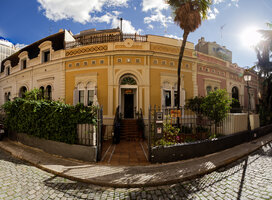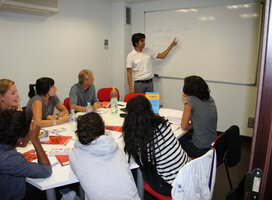Study Abroad Programs in Barcelona
Barcelona, the capital of Catalonia and the second largest city in Spain, is a global city, a major tourist destination, and a center of culture and industry. Located on the Mediterranean coast, it boasts great weather, unique architecture, and a fun ambiance.
From taking in Gaudi’s famous Sagrada Familia to strolling along Las Ramblas, a student or tourist in Barcelona is never bored. It is considered one of the top study abroad destinations for students who want to experience Barcelona’s culture, take in its beaches, or dance the night away in anyone of the huge discotecas.
Barcelona: famous for its history, its parties, its beaches and its culture. The capital of Catalonia and the second largest city in Spain, Barcelona is considered one of the world’s major global cities. There are weekend excursions a’plenty, with such notable nearby landmarks as Mt. Tibidabo, Montjuic Castle and the site of the 1998 Olympics.
Student Housing
If you study abroad with a third party provider, they almost always provide housing for students or can assist you with finding some. However, if you directly enroll in a university in Barcelona, you may be in charge of finding a homestay or apartment on your own. For student housing, Beroomers and UniPlaces are good places to check. For homestays, try Homestay.com.
Culture and Immersion
Barcelona is a city saturated with art and history. The minute you set foot in Plaza Catalunya – which will likely be your first stop from the airport – you need only peek a few blocks away to see the fantastical architectural wonderments of Gaudi. From Gaudi’s coveted La Pedrera to the infamously incomplete Sagrada Familia to the environmental getaway of Parc Guell, his artistic touch offers a whimsical feel unique to Barcelona. The Picasso museum can also be found in the heart of the city.
Catalunya is also a proud region. Boasting its own dialect and regional history, Catalonians even celebrate their own regional holidays and festivals, such as La Merce and La Diada Nacional. Many students studying Spanish are often shocked to find that they don’t overhear many Spanish conversations at all, but don’t worry, most Catalunians find it amusing to practice Spanish with foreigners.
…and many foreigners there are. Barcelona’s popularity with European students offers the opportunity to mingle with not only native Spaniards, but also with students (and citizens) from various European countries.
Culture Shock and Support
Dinner is at 9 p.m. on an early night, professors often show up rather late to class, city workers and sales associates do not pay nearly as much attention to customers as in American: These things, combined with distance from home and a completely unfamiliar territory, make for an almost inevitable bout of culture shock.
Luckily, many study abroad programs offer fantastic support systems. API, the program with which I studied abroad, kept students busy from their first day abroad by teaching us about regional classes, offering us office hours for supportive pep talks, and making sure students found a friend within the program.
You won’t regret a decision to study abroad in Barcelona; it is a city that has anything a foreign student could hope for.
Study abroad programs in Barcelona vary depending on what is offered, but you can expect to spend about $10,000 per semester. It is important to consider what is offered in your study abroad package before going abroad; because Barcelona is so aptly located for travel to the rest of Europe, many study abroad programs will offer international excursions, with all expenses included as part of their study abroad fee.
Because Spain’s currency is the euro, it is also important to explore the patterns of the exchange rate before going abroad, and factor that into you budget. Barcelona is a big city with big city prices, meaning it could be more expensive than options in southern Spain. There are, however, plenty of great deals for students throughout the city (free drink nights and a three month metro card for about 100 Euro, to name a few).
Ask your university whether or not scholarships that you receive each semester can be transferred towards your study abroad expenses; programs such as API will accept all funding that a school is willing to transfer, which can bring your study abroad cost down significantly. Or you can always apply for independent scholarships, such as the one offered by Go Overseas.
- API offers a variety of scholarships for those participating in their programs - including a few great options in Spain!
- CC-CS scholarship fund offers multiple scholarships, celebrating diversity or rewarding academic excellence for alumni and program participants.
- ISA sponsors the Dr. Carlos Castañeda Memorial Scholarships for students participating in an ISA program in a Spanish-speaking country.
- More Study Abroad Grants and Scholarships
Study Abroad Programs in Barcelona
Pagination
What People Are Saying
Related Study Abroad Articles
Frequently Asked Questions
-
Is it expensive to live in Spain?
While larger cities like Madrid and Barcelona can be on the more expensive side, the cost of living in Spain is lower than in most European countries. A room in a shared apartment in a city center like Madrid can range from about €350-€600 ($390 - $672 USD).
-
Is it safe to live in Spain?
Spain is a very safe country. But, just like the rest of Europe, Spain is notorious for pickpockets. It's important to not carry your passport around and always keep an eye on your phone!
-
How long does it take to get a Spain student visa?
Processing your visa application takes the consulate about 4 weeks. The most lengthy part of the process is collecting all of the documents and securing an appointment. For some consulates it is very difficult to secure an appointment, so it is best to plan ahead.
The documents needed to apply for a student visa are:
- National visa application form + photocopy
- Original passport + photocopy
- One recent passport sized photo (to be attached to the form)
- Copy of the acceptance letter from the Spanish University (in Spanish or with Spanish translation)
- Evidence of funds (could be a statement from the University describing housing or a notarized letter from your parents assuming financial responsibility)
- Proof of health insurance
- Medical certificate (only need for stays longer than 180 days)
- Express mail envelope with pre-paid stamps addressed to yourself with which the consulate may return your passport with the visa
Related Content -
Can international students stay in Spain after graduation?
Students studying in Spain who hold an EU passport will have a relatively simple time obtaining a work permit in order to stay in Spain. For students from other countries, the process is a bit more complicated. Before you can apply for the work visa, you would need to find a job that will hire you and can show the government that there were no suitable local candidates for that position. They can then sponsor you for a work and residence permit, after which point you can apply for a work visa.
-
How much does it cost to study in Spain?
Spain has 76 universities, and prices vary considerably depending on the institution and whether it's public or private. The average cost of studying abroad in Spain through a third-party provider is around $11,000 for a semester. Prices can be considerably lower if you are prepared to enroll directly at a Spanish university. Public universities can cost as little as $1,000 and private institutions can cost $7,000 and up.
Related Content -
Can I work in Spain with a student visa?
On a student visa, you can work up to 20 hours in Spain with a work authorization requested by the company you'd like to work for. The company will have to request this authorization from the Oficina de Extranjería (Foreigner's Office). It can take from 3 weeks to 3 months to process your application depending on the province, so it's best to apply as early as possible!
Related Content






























